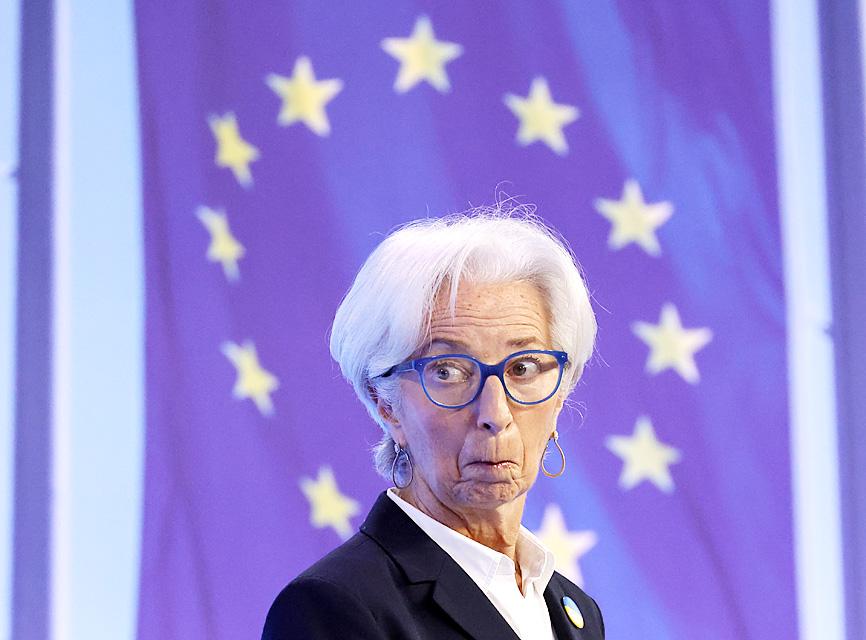The European Central Bank (ECB) on Thursday unexpectedly accelerated its wind-down of monetary stimulus, signaling that it is more concerned about record inflation than weaker economic growth as Russia’s invasion of Ukraine threatens to propel prices even higher.
Calling the war a “watershed” moment for Europe, ECB officials pledged to slow bond buying from the start of May, and said they could halt the program as soon as the third quarter.
They tried to temper that by making a subsequent interest-rate hike less automatic.

Photo: EPA-EFE
“The [ECB] Governing Council sees it as increasingly likely that inflation will stabilize at its 2 percent target over the medium term,” ECB President Christine Lagarde, who wore a badge with the colors of the Ukrainian flag on her jacket, told reporters in Frankfurt, Germany. “The war in Ukraine is a substantial upside risk, especially to energy prices.”
The outcome defied the expectations of economists who anticipated a delay in major policy decisions to allow time to assess the implications of Russia’s attack.
Some council members had also indicated that plans to end large-scale asset purchases and negative interest rates would probably be postponed.
Investors took the more rapid withdrawal of asset purchases as a sign that rate rises are nearing, with money markets now betting on a quarter-point increase in October, compared with earlier predictions of December.
They see two more hikes in the first half of next year, taking the key rate to 0.25 percent.
While the council no longer suggests interest rates could go “lower” than at present, it also now says that any hikes would be “gradual” and take place “some time after” bond purchases end rather than “shortly” after.
“Clearly ‘some time after’ is all-encompassing,” Lagarde said. “It can be the week after, but it can be months later. By that, I think we want to indicate that the time horizon is not what’s going to matter most. It’s the data that will support the decision.”
A hike this year would still leave the ECB behind some of its major peers in taking on inflation.
The Bank of Canada raised rates last week and predicts its balance sheet will shrink quickly once it starts running off its bond holdings.
At the US Federal Reserve, a rise is all but certain next week, when the Bank of England is widely expected to lift borrowing costs for a third straight meeting.
“On balance, Bloomberg Economics sees the outcome of the European Central Bank’s meeting as hawkish,” euro-area economists David Powell and Maeva Cousin said.
Since Russia’s invasion, Lagarde and her colleagues have been racing to evaluate how badly the EU would will be affected by sanctions, trade disruptions and, above all, surging energy costs.
What looks certain is that the Kremlin’s assault and the resulting advance for oil and natural gas contracts will drive inflation further beyond the current 5.8 percent record.
That makes it harder to provide support while keeping prices from spinning out of control.
“The balancing act faced by the ECB is an extremely challenging one,” Paul Craig, portfolio manager at Quilter Investors, said in a statement.
Faced with an inflationary shock that requires “quick and decisive action” as well as the threat of recession due to Russia’s invasion, the “ECB has opted for the path of least resistance,” Craig said.

Intel Corp chief executive officer Lip-Bu Tan (陳立武) is expected to meet with Taiwanese suppliers next month in conjunction with the opening of the Computex Taipei trade show, supply chain sources said on Monday. The visit, the first for Tan to Taiwan since assuming his new post last month, would be aimed at enhancing Intel’s ties with suppliers in Taiwan as he attempts to help turn around the struggling US chipmaker, the sources said. Tan is to hold a banquet to celebrate Intel’s 40-year presence in Taiwan before Computex opens on May 20 and invite dozens of Taiwanese suppliers to exchange views

Application-specific integrated circuit designer Faraday Technology Corp (智原) yesterday said that although revenue this quarter would decline 30 percent from last quarter, it retained its full-year forecast of revenue growth of 100 percent. The company attributed the quarterly drop to a slowdown in customers’ production of chips using Faraday’s advanced packaging technology. The company is still confident about its revenue growth this year, given its strong “design-win” — or the projects it won to help customers design their chips, Faraday president Steve Wang (王國雍) told an online earnings conference. “The design-win this year is better than we expected. We believe we will win

Chizuko Kimura has become the first female sushi chef in the world to win a Michelin star, fulfilling a promise she made to her dying husband to continue his legacy. The 54-year-old Japanese chef regained the Michelin star her late husband, Shunei Kimura, won three years ago for their Sushi Shunei restaurant in Paris. For Shunei Kimura, the star was a dream come true. However, the joy was short-lived. He died from cancer just three months later in June 2022. He was 65. The following year, the restaurant in the heart of Montmartre lost its star rating. Chizuko Kimura insisted that the new star is still down

While China’s leaders use their economic and political might to fight US President Donald Trump’s trade war “to the end,” its army of social media soldiers are embarking on a more humorous campaign online. Trump’s tariff blitz has seen Washington and Beijing impose eye-watering duties on imports from the other, fanning a standoff between the economic superpowers that has sparked global recession fears and sent markets into a tailspin. Trump says his policy is a response to years of being “ripped off” by other countries and aims to bring manufacturing to the US, forcing companies to employ US workers. However, China’s online warriors